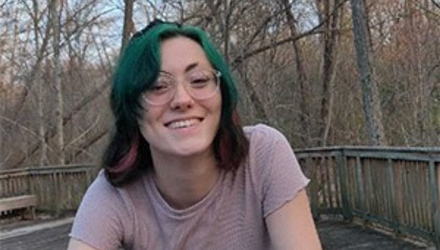Name: Cassydee Buttadaruo
Age: 20
Where do you call home? I live in Georgia
Education/Career: I have an Associate’s degree in Interdisciplinary Studies. I’m unsure if I’d like to continue with school, but if I were too, I’d like to get a Bachelor’s degree in English because I really enjoy writing.
Who do you live with? I currently live with my parents and siblings who all range from the ages of 3 to 11.
How long have you known you are living with FA? I’ve known that I live with FA for about 3 and a half years (diagnosed July 19, 2017). I began my road to learning about FA back in April of 2017 after I’d gone to my pediatrician for a check and my mom mentioned that I didn’t walk straight. Later that day, I was sent for a CAT scan to see if maybe I had a tumor or something else that was affecting my ability to walk straight. Of course, they didn’t find anything out of the ordinary, but it sent everything into a spiral and it felt like I had a doctor’s appointment about every other week. I had an MRI done, went to see a Neurologist, and saw a movement specialist doctor, but they still couldn’t place their fingers on what was wrong. Although, in the end, I was sent to get genetic tests done, and 10 days before my youngest sister was born, I learned that I had FA.
Describe your transition from walking to walker/wheelchair: I have to admit, I was a little scared and embarrassed to have to transition to use a cane and walker from having walked independently for years beforehand. It was a hard decision for me, but at the end of the day, I realized it would be safer for me. Surely, at first, I felt awkward and uncomfortable in public having to use these assistive devices, but as I grew comfortable and confident in myself, it didn’t bother me as much as it did previously.
What do you like to do to stay active and what type of exercises work for you to stay strong? I go to physical therapy every other week and occasionally do some exercises I can from PT at home. Also, before the global pandemic started and limited people from getting out of the house, my fiancé and I would go to the park and try to walk a good bit.
Do you have any hobbies or special interests? I enjoy writing, collecting books (because I never seem to find the time to read any of them), reptiles (I have three leopard geckos), and I like to find new TV shows or scary movies to watch.
When FA gets you down, what do you think/do to feel better? I like to remind myself that I have a wonderful group of FA friends to help support me in a rough day or time. I also tend to just try to relax and indulge myself in a nice snack and TV to help me feel better.
What is one way living with FA has POSITIVELY affected your life? It’s allowed me to meet so many other people like me and know that I am not alone in this fight.
What is one piece of advice that someone with FA has given you that encourages and inspires you? People always tell me that FA does not define me, and that has stuck with me since.
What is the best advice YOU could give a person who has been recently diagnosed with FA? Rounding back to the previous question, I would have to offer the same piece of advice and remind them that FA isn’t all that they are and that they are worth so much more.
What is the first thing you want to do when a cure/treatment to FA is found? I’m not exactly sure what I’d do if a treatment was found. I think maybe I’d have some celebration, or if it was completely cured, I would try to go on a run.
“I have FA but FA doesn’t have me.” What does this statement mean to you? How do you live your life in the face of adversity? To me, the statement sounds similar to “FA doesn’t define who you are.” I feel as if the statement is saying that, yes, I have FA, but no, I won’t let it control my life and tell me what I can and cannot do. In the face of adversities, I try to live my life just as everyone else would, although I know my limits when I do need the help for something.
Interview by
Carrie Bolinger
